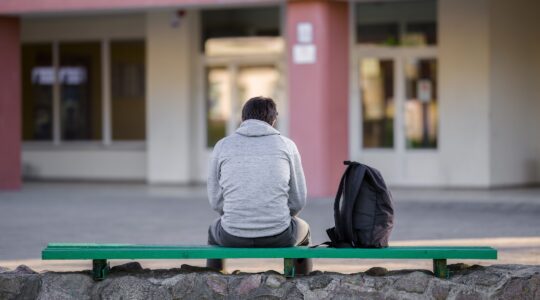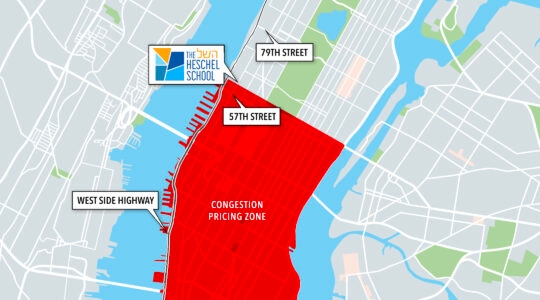Following a conference at Princeton University in the 1990s, two young Hebrew Union College deans went for a ride.
Rabbi Michael Marmur, who served at the school’s Jerusalem campus, was the passenger. Rabbi Aaron Panken, who worked at the seminary’s Manhattan branch, was at the controls of a small airplane.
Rabbi Panken, a licensed pilot, showed his guest the striking skyline of Manhattan, while the pair discussed “questions of what was happening at the school, what was happening in the world,” Rabbi Marmur said this week.
“It’s a particularly sad memory,” said Rabbi Marmur, now provost at the Hebrew Union College – Jewish Institute of Religion. Rabbi Panken, president of HUC since 2014, died on May 5 when the Aeronca 7AC aircraft he was piloting crashed in a wooded area shortly after taking off from Randall Airport in Orange County. He was 53.
A passenger, Frank Reiss, a flight instructor, was injured in the crash, whose cause is unclear pending investigation by the Federal Aviation Administration and the National Transportation Safety Board.
Rabbi Panken’s death leaves the Reform rabbinical school — which also has branches in Los Angeles and Cincinnati — without its top executive. HUC did not immediately announce an interim appointment to succeed Rabbi Panken, the institution’s widely admired 12th president in its 143-year history.
At the funeral Tuesday afternoon at a packed Westchester Reform Temple in Scarsdale, where he had served early in his career, Rabbi Panken was remembered for his work and his influence.
Rabbi Rick Jacobs, president of the Union for Reform Judaism, said Rabbi Panken “modeled how to live a Jewish life with depth and integrity.” Rabbi David Stern, senior spiritual leader of Temple Emanuel in Dallas, and son of the late Rabbi Jack Stern, spiritual leader of the Westchester Reform Temple from 1962 to 1991, said “he was curious about anything and everything … he was curious about you and me.”
“Aaron,” said his father Peter, “wanted to be a force for good in the world.”
The funeral service was full of laughter over Rabbi Panken’s quirky habits and innovative seders.
Rabbi Panken died the day before he was to participate in an HUC ordination ceremony. Rabbi Norman Cohen, the school’s former acting president, presided at the ceremony.
At the ceremony, Rabbi David Adelson, HUC dean, said, “it will take us a while to even formulate the words to express all of what we are feeling. He was our president, our teacher, our colleague and our friend. It is because of his work on our behalf that we all stand here today.”
Rabbi Panken’s death brought an outpouring of praise for him this week.
“A great loss for the entire Jewish people,” said Dani Dayan, Israel’s consul general in New York.
“A rare combination of the inner life and the outer life,” said Rabbi Marmur, noting that Rabbi Panken was an avid hiker.
“A president waiting to happen,” said Rabbi Lawrence Hoffman, who retired this year from his position of liturgy at HUC.
Colleagues and friends cited Rabbi Panken’s record of bringing new technology to HUC, strengthening the recruitment of faculty members and students, succeeding as a fund-raiser, and bolstering ties among the school’s four campuses.
A trained engineer, “He loved taking problems apart” and finding a proper solution, Rabbi Hoffman said. “He seemed to believe that anything is possible if you think it through long enough.”
At the funeral, Rabbi Hoffman added poignantly, “Aaron was never daunted by anything. The tragedy is that he was just hitting the stride.”
People who knew Rabbi Panken described him as someone who had the confidence to institute programmatic and curriculum changes at HUC but was humble in his personal relationships; who combined an engineer’s insistence on precision with a great sense of humor; who dealt with the highest level of public officials and Jewish leaders but was the first to call when a friend was going through tough times. He was a zealous advocate of Reform Judaism but reached out to the wider Jewish community; he favored religious pluralism in Israel but played a largely behind-the-scenes role in the issue and he dealt in depth with classical Jewish texts but thought quickly on his feet.
With a special interest in HUC’s Jerusalem campus, Rabbi Panken initiated several Israel-related programs, including one that brings Israeli rabbinical students and graduates to this country to learn more about Jewish life in the diaspora. Another program, in partnership with the Israeli Foreign Ministry, is designed to strengthen ties between young Reform Jewish leaders and key Israeli political and cultural figures.
The rabbi also created a program that brings Jewish, Christian and Muslim schoolteachers in Israel to the HUC Jerusalem campus to delve into the concept of tolerance.
“The systematic approach involved in engineering always fascinated me,” Rabbi Panken said in a 2014 interview with Reform Judaism magazine. “When you have a problem to solve or want to design something new, you plan, build, test, and revise. Eventually, you have a working product that actually does what you would like it to do.”
In the same Reform Judaism magazine interview, Rabbi Panken talked about a call he received from Rabbi Michael Chernick, an Orthodox rabbi who taught Talmud at HUC, shortly after Rabbi Panken began working at Congregation Rodeph Sholom in the early 1990s. Rabbi Chernick offered to continue learning Talmud with his former student.
“He called me up,” recalled Rabbi Panken, “and said, ‘I’m going to come to your office two or three days a week this summer and teach you more Talmud.’”
Rabbi Panken “was an exceptional student with a desire to continue his Talmud study,” Rabbi Chernick, who has subsequently retired and made aliyah, told The Jewish Week this week in an email interview. During their one-on-one chavruta learning sessions they concentrated on the fourth chapter of Tractate Gittin, about the laws of divorce.
Rabbi Chernick said his Talmud study with Rabbi Panken “made him more demanding regarding his own knowledge of what had been the historic Jewish tradition and ensuring that [future HUC] students had a similar knowledge of it. The dialectics of Talmudic thinking made him conscious of the multifacetedness of any argument. This made Aaron, who was always a good listener, a better one.”
In recent years, Rabbi Chernick said, “we’d still get together for an occasional breakfast to keep the connection alive. That is my last memory of him — sitting over a coffee a few months ago talking about family, the health of HUC-JIR and Aaron’s hopes for the future.”
♦
Rabbi Panken, who studied at Johns Hopkins University and New York University (he was ordained by HUC in 1991), took a circuitous route to Reform Judaism.
A native of the Upper West Side, he was on his way home from school one day in fifth grade and walked into Lincoln Square Synagogue, a Modern Orthodox congregation. “I’d like to go to religious school,” he told the receptionist, in a story he related in HUC’s in-house magazine. “That’s lovely,” another synagogue staff member told him. “Could I talk to your parents about that?”
His parents told him that day, “Aaron, we’d prefer that you go to a place where what they teach is a little closer to what we believe.” In other words, not Orthodox.
Rabbi Panken enrolled in religious school at Stephen Wise Free Synagogue, then became active in the Reform movement’s youth groups and camps.
Later, while working at Johns Hopkins biomedical engineering labs, he “realized … I wanted meaningful learning and the kind of interactions with people I’d enjoyed during my Jewish youth group days.” Eventually, “I came to the conclusion that the rabbinate was the right path for me.”
Rabbi Panken served on the rabbinical staff of Rodeph Sholom in Manhattan, and as a rabbinical intern at Westchester Reform Temple. A resident of Mamaroneck, he joined the HUC faculty in 1995, teaching rabbinic and Second Temple literature, and serving in several administrative positions.
As HUC president, he encouraged a stronger outreach to Jewish high school and college students. “We have to better penetrate those markets,” he said in a 2013 interview with The Jewish Week. “It’s not been good enough. … Those students will be at the age when they are making vocational decisions.
“I’d love to see more people who have had significant and meaningful Jewish experiences actually consider these careers” in the Jewish community. “Unfortunately, for a lot of young folks it’s not the first things people are talking about as a career choice. The rabbi/cantor/educator who was so inspiring for you as a young person — you can be that person.”
Rabbi Joseph Skloot, assistant professor at HUC of modern Jewish intellectual history, called his friend of 15 years “a person of unparalleled warmth, generosity, creativity … a deep, deep Jewish soul.”
“A brilliant Jewish leader, an incredible mensch, and a dear friend,” Daniel Shapiro, former U.S. ambassador to Israel, said in a Twitter message.
HUC cantorial student Mike Jarvis wrote in a Facebook message that “Rabbi Panken wasn’t just brilliant, he was kind. He wasn’t just great, he was good. He wasn’t just our leader, he was our friend.”
The rabbi is survived by his wife, Lisa Messinger; two children, Eli and Samantha; his parents, Beverly and Peter; and a sister, Rabbi Melinda Panken of Congregation Shaari Emeth in Manalapan, N.J.
Two days before he died, Rabbi Panken addressed a new crop of HUC graduates at an ordination ceremony. “We are a people of action and courage, of innovation and fearlessness, of adaptation and endless creativity,” the rabbi said. “Even in the darkest of times, we have faced challenges and overcome them.” After many historical tragedies, he said, “we mourned, but we learned to remember, and we learned to rebuild. That’s what it means to be part of our Jewish community.”
The New York Jewish Week brings you the stories behind the headlines, keeping you connected to Jewish life in New York. Help sustain the reporting you trust by donating today.




